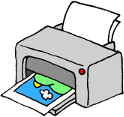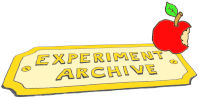Fun and easy science experiments for kids and adults.
Physics
Build a simple homopolar motor with lights. This experiment demonstrates how the relationship between electricity and magnetism can give rise to forces and motion.
| Gilla: | Dela: | |
Video

Materials
- 1-2 neodymium magnets
- 1 electrical wire
- 1 pair of cutting pliers
- A 1.5 V battery
- Tape
- 1 screw
- A 3 V watch battery
- 2 LED lights
Warning!
Separate wire and battery when not in use. The cable may become hot and cause a fire.Step 1


Step 2


Step 3


Step 4


Extra flashy electric motor (steps 5-8):
Source: "World's Simplest Motor Version 02 - Sick Science! #033". Steve Spangler Science.Step 5


Step 6


Step 7


Step 8


Short explanation
There is a close connection between electrical and magnetic phenomena. Here, an electric current in the copper wire is conducted through the magnetic field around the magnets. This causes a force to arise, which pushes on the magnet and causes it to move.Long explanation
You have just built a machine that can make something move with the help of an electric current - an electric motor. The electric motor works thanks to a certain interaction that exists between an electric current and a magnetic field. There is a magnetic field around the magnet. This field surrounds the magnet like a sphere, but is also said to have a direction (B in the picture). This direction is the direction in which the north end of a compass needle points. Around a magnet this direction is; out from the north pole of the magnet (top end in this case), around in a large arc outside the magnet, and into the south pole of the magnet (bottom).
 If an electric current is placed in this magnetic field, things can happen. In this demonstration, an electric current (I in the picture) passes from the positive terminal (bottom) of the battery to its negative terminal (top). The electric current passes mainly through the copper wire, but also through the screw and the magnet. The fact that the magnet is also part of the electric circuit is not necessary - it's enough that the magnet is only nearby - but here it is practical.
Where the electric current moves in the same direction, or in the exact opposite direction, as the direction of the magnetic field, nothing happens. But where this is not the case, a force (Lorentz force) arises on the material that conducts the electric current. This force is greatest where the current moves perpendicular to the magnetic field. In this electric motor, it takes place approximately in the middle of the copper wire, but also inside the magnet (see picture). Since the magnetic field is greatest inside the magnet, the force is also greatest there.
The force (F in the picture) acting on the copper wire is directed both perpendicular to the direction of the current and the direction of the magnetic field at this location. The result is that the magnet is begins to rotate.
This type of electric motor is called a homopolar motor, because the direction of the current is always the same. This type of electric motor was the very first to be designed, by the Englishman Michael Faraday in 1821.
If an electric current is placed in this magnetic field, things can happen. In this demonstration, an electric current (I in the picture) passes from the positive terminal (bottom) of the battery to its negative terminal (top). The electric current passes mainly through the copper wire, but also through the screw and the magnet. The fact that the magnet is also part of the electric circuit is not necessary - it's enough that the magnet is only nearby - but here it is practical.
Where the electric current moves in the same direction, or in the exact opposite direction, as the direction of the magnetic field, nothing happens. But where this is not the case, a force (Lorentz force) arises on the material that conducts the electric current. This force is greatest where the current moves perpendicular to the magnetic field. In this electric motor, it takes place approximately in the middle of the copper wire, but also inside the magnet (see picture). Since the magnetic field is greatest inside the magnet, the force is also greatest there.
The force (F in the picture) acting on the copper wire is directed both perpendicular to the direction of the current and the direction of the magnetic field at this location. The result is that the magnet is begins to rotate.
This type of electric motor is called a homopolar motor, because the direction of the current is always the same. This type of electric motor was the very first to be designed, by the Englishman Michael Faraday in 1821.
Experiment
You can turn this demonstration into an experiment. This will make it a better science project. To do that, try answering one of the following questions. The answer to the question will be your hypothesis. Then test the hypothesis by doing the experiment.- What happens if you use another type of magnet?
- Waht happens if you use more magnets on top of each other?
- What happens if you use another type of battery instead of the 1.5 V battery?
| Gilla: | Dela: | |
Similar
Latest
Content of website
© The Experiment Archive. Fun and easy science experiments for kids and adults. In biology, chemistry, physics, earth science, astronomy, technology, fire, air and water. To do in preschool, school, after school and at home. Also science fair projects and a teacher's guide.
To the top
© The Experiment Archive. Fun and easy science experiments for kids and adults. In biology, chemistry, physics, earth science, astronomy, technology, fire, air and water. To do in preschool, school, after school and at home. Also science fair projects and a teacher's guide.
To the top

































































































































